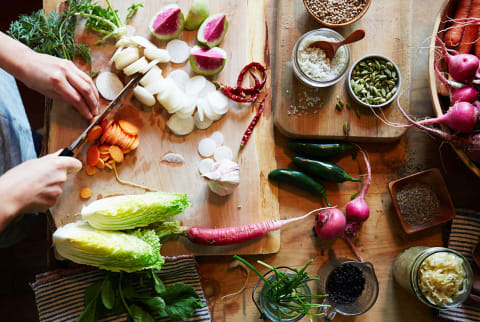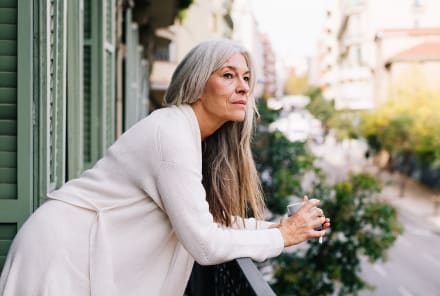Advertisement
Why I Believe We Need A Better Food System — For Our Health & The Planet's


Every year, I make the same New Year's resolution: take better care of myself so, in turn, I can take better care of others. As a mom of two, this can be challenging—particularly when I'm boiling rainbow bagels at 11 p.m. the night before my son's birthday, and then realize there's a mountain of emails ahead of me, a board meeting I need to prep for…the list goes on. Thankfully, I can remind myself that most of the work on my list actually does support half of my resolution: to take better care of others. My work is driven by my goal of creating and advocating for a healthier food system built on fruits and vegetables—a system that is better for people and for the planet.
Fruits and veggies are important—and so is how they're grown.
"Eat your broccoli" is not the empty rallying cry of moms across America. Time and time again, science has shown the benefits of a diet rich in fruits and vegetables. According to a report from the Harvard School of Public Health, eating more produce can "lower blood pressure, reduce the risk of heart disease and stroke, prevent some types of cancer, lower risk of eye and digestive problems, and have a positive effect upon blood sugar." And while adding more fruits and vegetables to your diet is a great place to start, I also encourage people to take a look at where that produce is coming from and how it's being grown.
Today's conventional food system, which depends on synthetic pesticides and fertilizers, is depleting our soil, polluting our water, and causing harm to our bodies and planet1. Organic foods grown with regenerative agricultural practices, on the other hand, aren't dependent on potentially harmful practices. Plus, research shows they're actually more nutrient-dense and have more antioxidants2 compared to their conventionally grown counterparts.
From my vantage, I believe Big Food needs to be dismantled and rebuilt.
The problem we face today.
Here's what we're seeing now: From seed to shelf, our current conventional food system has engineered a way to mass-produce food items that last on grocery shelves forever in order to maximize the bottom line—even if it comes at the expense of human and planetary3 health. The system often hides behind marketing tricks, like calling food "low-fat," "sugar-free," and even "natural" to disguise artificial ingredients, pesticides, and other harmful chemicals. Sometimes foods are even labeled "better for you," when they might not be.
And this doesn't bode well for the health of the planet, either. According to the United States Environmental Protection Agency (EPA), agriculture as it exists today is a bigger contributor to the climate crisis than all of the energy we use in our homes. Just recently, the UN issued an urgent call for greener, more inclusive food systems to address the climate crisis. Highly processed, engineered foods prioritize mono crops (crops like corn, wheat, and soy that are grown on the same land year after year without rotation and typically receive heavy government subsidies) deplete the soil of nutrients and require more fertilizers and pesticides in order to stay in production. These chemicals then make their way into the ground, water, and air, contributing to pollution4.
So, what can we do about it?
The good news is: The future of the food system can be different. Growing and eating fruits and vegetables more responsibly is a great first step, but I know that's not always easy. Big change takes all of us: consumers, corporations, government agencies, and elected officials.
My company, Daily Harvest, is working to be a leader in the industry and make it easier to eat more organic fruits and vegetables—but frankly, we're just one model, and we need a whole ecosystem of businesses and government programs to make a wide range of organic, regeneratively grown fruits and vegetables accessible to consumers and sustainable for farmers.
Thankfully, some Big Food companies recently pledged to do more for the health of our planet, including reducing emissions and moving toward more regenerative farming practices, but these are small steps spaced over decades. In the meantime, we need companies to quickly and dramatically expand commitments to growing and sourcing a wide variety of sustainably and organically grown ingredients. We also need elected officials to do more to support farmers in transitioning to organic, regenerative, and sustainable practices so that fresh produce is more accessible to all.
And our job as individual consumers, along with eating more fruits and vegetables, is to ask for transparency around corporate marketing practices. We can pressure our elected officials to enact laws and policies that will make it easier for all of us to access truly nutritious options—and we can demand that those options are grown, sourced, and made responsibly.
Bottom line.
I can take care of my personal resolution by making sure that I eat five servings of fruits and vegetables every day, but I know that to truly take care of others I also need to double down on my commitment to changing the food system (and, yes, still making bagels for my kids).
It's easy to feel powerless when looking at all that has to change, so instead I look at what I can do. In a way, isn't that taking care of myself, too?
Watch Next
Enjoy some of our favorite clips from classes
Enjoy some of our favorite clips from classes
What Is Meditation?
Mindfulness/Spirituality | Light Watkins
Box Breathing
Mindfulness/Spirituality | Gwen Dittmar
What Breathwork Can Address
Mindfulness/Spirituality | Gwen Dittmar
The 8 Limbs of Yoga - What is Asana?
Yoga | Caley Alyssa
Two Standing Postures to Open Up Tight Hips
Yoga | Caley Alyssa
How Plants Can Optimize Athletic Performance
Nutrition | Rich Roll
What to Eat Before a Workout
Nutrition | Rich Roll
How Ayurveda Helps Us Navigate Modern Life
Nutrition | Sahara Rose
Messages About Love & Relationships
Love & Relationships | Esther Perel
Love Languages
Love & Relationships | Esther Perel
What Is Meditation?
Box Breathing
What Breathwork Can Address
The 8 Limbs of Yoga - What is Asana?
Two Standing Postures to Open Up Tight Hips
How Plants Can Optimize Athletic Performance
What to Eat Before a Workout
How Ayurveda Helps Us Navigate Modern Life
Messages About Love & Relationships
Love Languages
Advertisement

This Little-Known Supplement Helps Women Sleep & Decreases Signs Of Depression
Molly Knudsen, M.S., RDN

Want To Be Metabolically Healthy? New Study Shows An Underutilized Approach
Molly Knudsen, M.S., RDN

This Little-Known Supplement Helps Women Sleep & Decreases Signs Of Depression
Molly Knudsen, M.S., RDN














